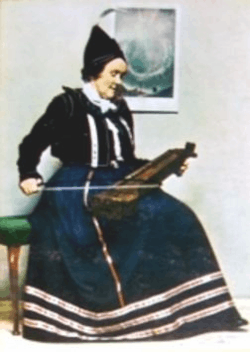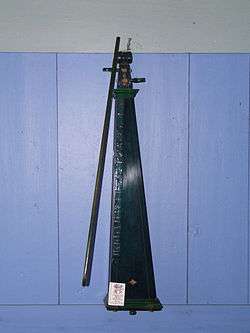Langspil


The Langspil (Icelandic pronunciation: [ˈlauŋ̊spɪl]) is a traditional Icelandic drone zither. Since old folk music has been gaining more popularity in recent years, more and more people are able to play this instrument. And since it only has 1 melody string with 1 to 5 drone strings (usually 2) it is easy to learn to play it compared with more complicated instruments.
The langspil can be played by plucking the strings by hand, with a bow or by hammering. Langspils exist in two basic versions, straight and curved and are generally around the length of 80 cm, but can be as long as 104 cm or as short as 73 cm. Many different types of wood have traditionally been used, including pine, fir, beechwood, birch, oak and walnut, since they were generally constructed from driftwood.[1]
History
The oldest written sources describing the langspil are from the 18th century. In those times langspils are described as a long thin box, wider at the bottom end and with one to six strings. In the early 19th century a version with a curved soundbox emerged which has improved sound qualities. In 1855 the book Leiðarvísir til að spila á langspil (A guide on playing the langspil) was published. It also included information on how to make langspils, although with a slight printing error in the fretting. This book increased the popularity of the Langspil quite a lot.[2] However by the middle of the 20th century the instrument had become rare and few played it any more.[3]
By the 1960s the singer, Anna Þórhallsdóttir, realized that the langspil was slowly disappearing from Icelandic musical traditions and as a response she spearheaded its revival, which is still ongoing.[4] Today a number of bands and performers include the langspil in their reportoire, including Spilmenn ríkinís, Sigurður Rúnar Jónsson aka Diddi fiðla, Bára Grímsdóttir, Chris Foster and Þórður Tómasson á Skógum. The langspil also has an important place on the yearly folk-song festival on Siglufjörður.[5]
Sources
- ↑ David G. Woods, "Íslenska langspilið". Árbók hins íslenzka fornleifafélags. 1993. p. 109-128.
- ↑ Ari Sæmundssen, Leiðarvísir til að spila á langspil. Akureyri. 1855.
- ↑ David G. Woods, "Íslenska langspilið". Árbók hins íslenzka fornleifafélags. 1993. p. 109-128.
- ↑ Anna Þórhallsdóttir, "Langspil". Tíminn. 19. August. 1961. p.11.
- ↑ Þjóðlagahátíðin á Siglufirði
See also
- Appalachian dulcimer
- Epinette des Vosges
- Hummel (instrument)
- Langeleik
- Scheitholt
- Fiðla, the other string instrument native to Iceland
| ||||||||||||||||||||||